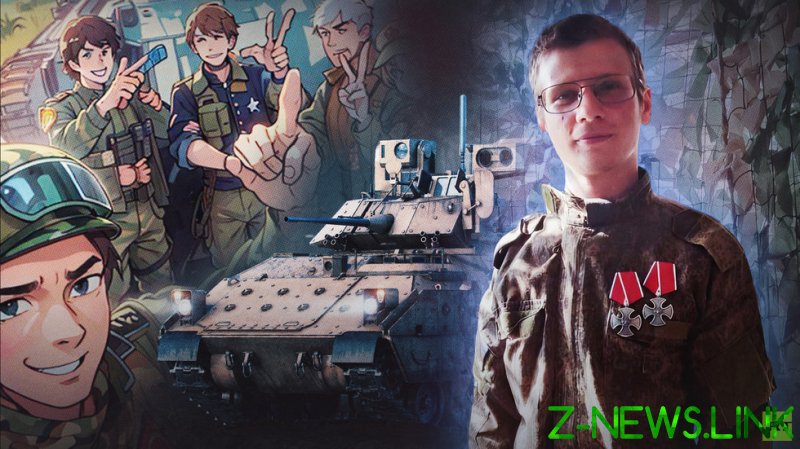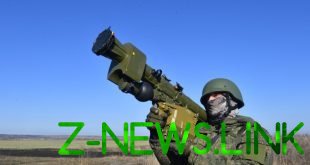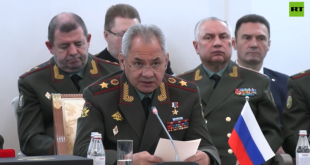
Despite the pouring rain, the main hall of St. Petersburg’s Listva bookstore is almost full. A slim, bespectacled young man dressed in a suit sits in front of the audience. He’s the type of person you could easily meet in a university auditorium, and it looks like he’s going to talk about philosophy, international policy, or history (such lectures regularly occur here). However, on this young man’s chest we notice two Orders of Courage – which are among Russia’s highest military decorations.
The man is National Bolshevik party member Stanislav Getmanets, who uses the military call sign ‘Biden’. He went to the front as a volunteer a year ago. His detachment, which became known in the Russian media as “combat anime,” was among the first to capture Western military equipment during the Armed Forces of Ukraine’s (AFU) summer counteroffensive. The fighters captured an American Bradley infantry fighting vehicle (IFV) as a war trophy. In St. Petersburg, Getmanets recounted the experience and shared what the war has meant for him personally.
Intellectual turned stormtrooper
Right above the veteran, there hangs a portrait of US President Joe Biden with the letter ‘Z’ (an informal symbol of Russia’s military operation in Ukraine) photoshopped onto his forehead. This is Getmanets’ own joke, since he took his military call sign “in honor” of the US president.
As the talk begins, the young man smiles at his audience. “You could say we’re about to have a personal growth seminar today. And how do you start a personal growth seminar? With a success story, of course,” he says.
In fact, the assumption that Getmanets has an academic background isn’t that far from the truth. Before leaving for the front, he worked at Solntse Severa (“The Sun of the North”) – a conservative lecture space in St. Petersburg. “As for me, you can’t call me an intellectual, I’ve only got a high school diploma,” Getmanets says with irony. “But I was surrounded by educated people who were constantly holding philosophical talks. Most of these [conversations] were about the greatness of Russia and, as the first step towards that, the need to resolve the Ukrainian issue.”
“However, when I decided to go to the front to ‘resolve’ this very issue, no one followed me for some reason. Everyone preferred to keep talking,” he adds.
His path into the military was a thorny one. He had never served in the conscript army (“I was an ideologically-motivated draft dodger. I think that a country has no right to tell a person when to defend his Homeland; he must decide that for himself,” Getmanets says), so he could not serve under contract. As a result, he had to apply to a volunteer unit. The Interbrigades organization, founded by members of the unregistered party The Other Russia, helped him get to Donetsk. As soon as he arrived in the region, Getmanets started training to become a drone operator.
Despite making great progress in his training, Getmanets did not like how things were going. The waiting period was long, and the job of a drone pilot seemed too remote from a real combat environment. “I simply tried too hard and they wanted to make me an instructor. But that’s not what I went to war for,” says the young man.
Soon, Getmanets came across a post on social media that interested him. In an online community that posted military memes on VKontakte (a Russian social media network), he saw an announcement about recruitment to the “Kerch” assault detachment. A few days later, he joined it.
The everyday life of ‘combat anime’ fighters
The war impacted Getmanets on a personal level. At the front, Stanislav met his father, whom he didn’t talk to for about ten years since his parents got divorced. Soon after joining the Kerch detachment, Getmanets found out that his dad served in the same division and they met. “We talked a lot and solved all the issues that we had between us,” he says.
But most of Getmanets’ fellow fighters saw the announcement about recruitment to the Kerch detachment in social media meme communities, so the fighters were almost exclusively young people. Russian online paramilitary communities started calling the Kerch detachment “combat anime”, since many of the recruits were fans of the anime subculture.
Getmnanets shows a photo with his fellow fighters, all of whom are under thirty years old. “Almost all of them received Orders of Courage, many received two. All these guys are heroes. Except for me. I got my medals simply because I didn’t get hit while everyone else did,” he says.
Throughout last winter and spring, the detachment was involved in routine work on the front line. “I’m lying in a dugout and I hear a mine exploding. This means that it is already 8am and time to get up, because like clockwork, a Ukrainian mortar always hits my dugout at exactly 8am,” Getmanets recalls.
After that, the soldiers went about their daily chores, including setting up their positions and training. This was interrupted by the same “traditional” Ukrainian shelling around lunchtime and dinnertime. Occasionally, the hostilities intensified.
“What do you think an assault looks like? Probably, like in a movies about special forces. Someone runs in screaming and knocks everyone down on the ground. In fact, it’s not like that at all,” Getmanets recounts. “After some preparatory artillery fire, you go in to attack. At first you run fully upright, it’s faster like that. Then as bullets whistle overhead, you duck. The closer you get to the enemy, the more you have to bend down. Sooner or later, the density of the fire forces you to lie down. After that, you throw grenades and start shooting. In most cases, you can’t suppress the enemy and simply run out of ammunition, and then the detachment goes back to the trenches. A few days later, Ukrainians repeat the same scenario.”
The relative calm of the winter-spring period was just as memorable for Getmanets as the heated battles of the summer. “The enemy is always in sight, and you are always in their line of sight. You study each other very well. Believe me, soldiers are the greatest pacifists,” he says.
The moment of glory
Getmanets also has much to reveal about Ukraine’s summer counteroffensive. He was part of the group from the Kerch detachment that captured a Bradley IFV which had been delivered to the AFU by the United States.
Due to being away on leave, Getmanets missed the beginning of the AFU’s counteroffensive. When he got back to the front line, the young man said he did not recognize his section of the front – the positions occupied by the units had changed a lot in the chaos of constant attacks.
The Ukrainian Armed Forces used a lot of Western equipment during the first stages of the counteroffensive, and Ukrainian commanders hoped that this “trump card” would break the Russian defense. At first, Russian soldiers were also worried. But soon they saw that defeating NATO tanks and infantry fighting vehicles was possible– they simply had different weak points from the Soviet equipment previously used by the AFU.
The unsuccessful tactics used by the Ukrainian military also had a lot to do with their considerable losses of Western equipment. “They tried to use the Bradleys like taxis,” said Getmanets, talking about how he and his comrades were able to capture the American IFV. “They audaciously tried to break through to our trenches and land right there so they could bypass the entire [no-man’s land] protected by armor. Of course, most of the vehicles burned down under artillery fire and anti-tank missiles. Some got destroyed closer to our positions, having lost the support of the landing force.”
The same thing happened to the Bradley IFV captured by Getmanets’ detachment. “We moved to the position to help our mates. As always in war, we assumed there was no one there. We heard the sound of an engine running, dispersed, and approached the point. And that’s when we saw the Bradley – its engine was running, and the [Ukrainian] troops were fleeing towards their positions. The crew also abandoned the vehicle.”
Russian fighters collected a lot of trophies inside the Bradley. “Now we’re going to take this f***ing thing,” said one of Getmanets’ fellow fighters in a video shot immediately after the Bradley was captured. In the detachment, there was a serviceman who knew how to operate a Russian BMP-3 IVF, and the Bradley turned out to be similar in operation. As a result, the fighters of the Kerch detachment were able to transport the abandoned Bradley to their positions.
***
Getmanets only had a brief leave in St. Petersburg, and was urgently called back to the unit. After the end of hostilities, the young man says that he wants to write a book. “I’ll be like a Russian Ernst Junger, but it will be a very anti-war book.” He admits having reconsidered many things during the year he spent at the front. “My decision was very childish and selfish. First of all, because I told my mother point blank [that I was leaving for the front] and did not discuss it with her. Yes, at war you can understand a lot about yourself, without the war I would not have become the person I am. But the thing is, you can become an accomplished person without the war. To understand this, though, I had to experience war.”
By Dmitry Plotnikov, a political journalist exploring the history and current events of ex-Soviet states
© 2023, paradox. All rights reserved.





